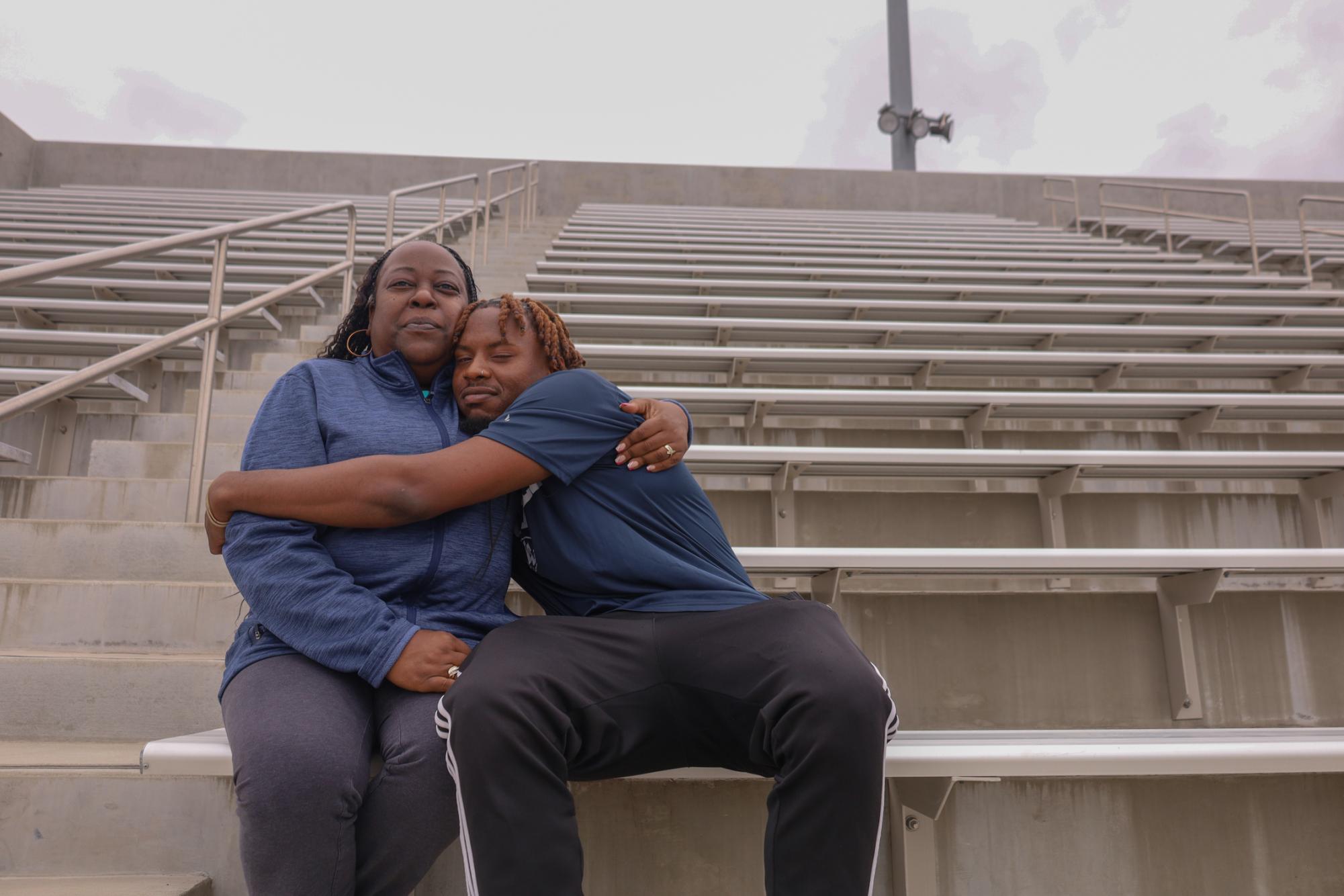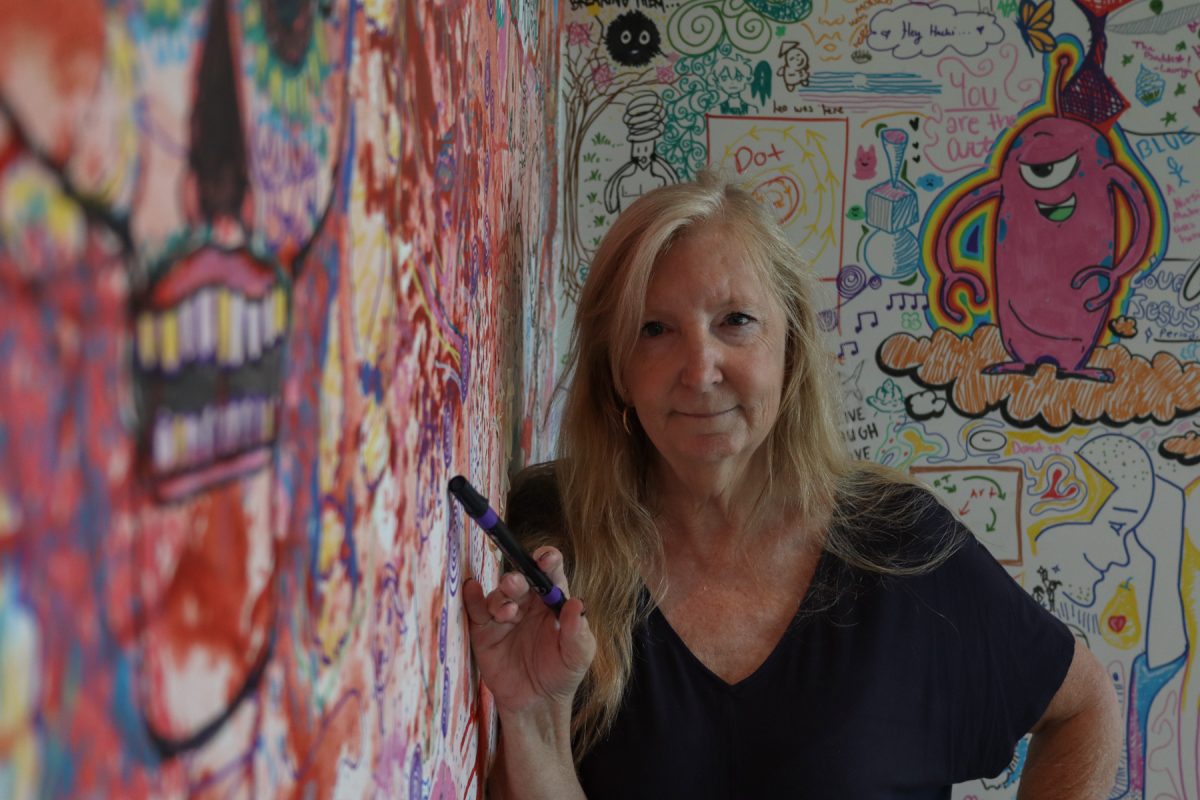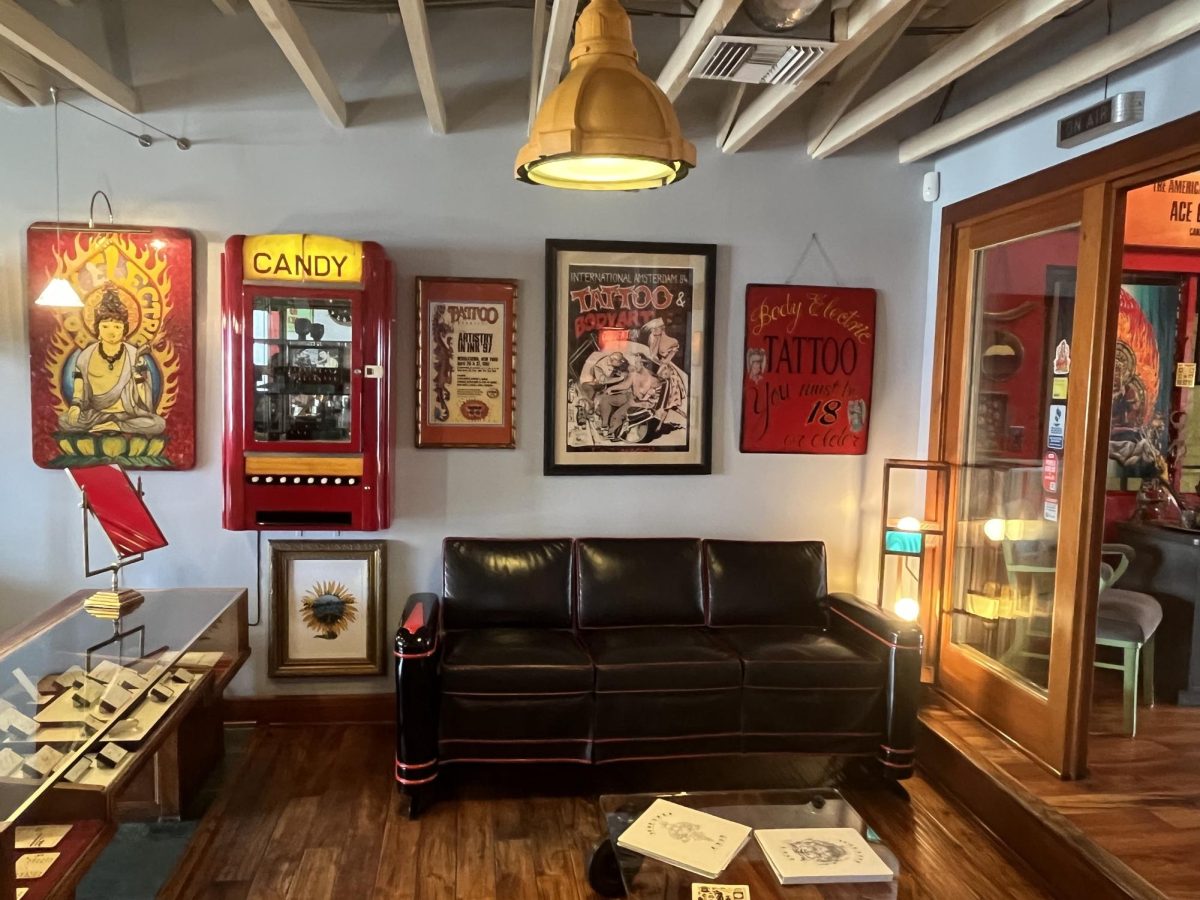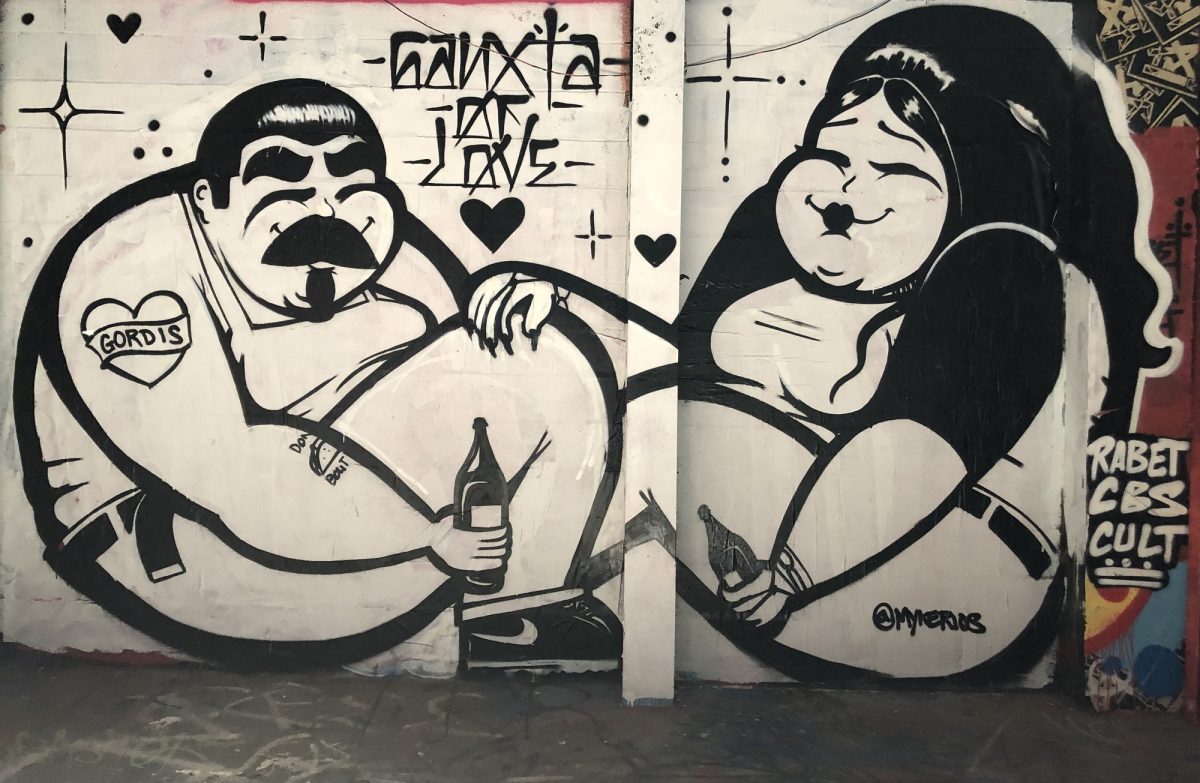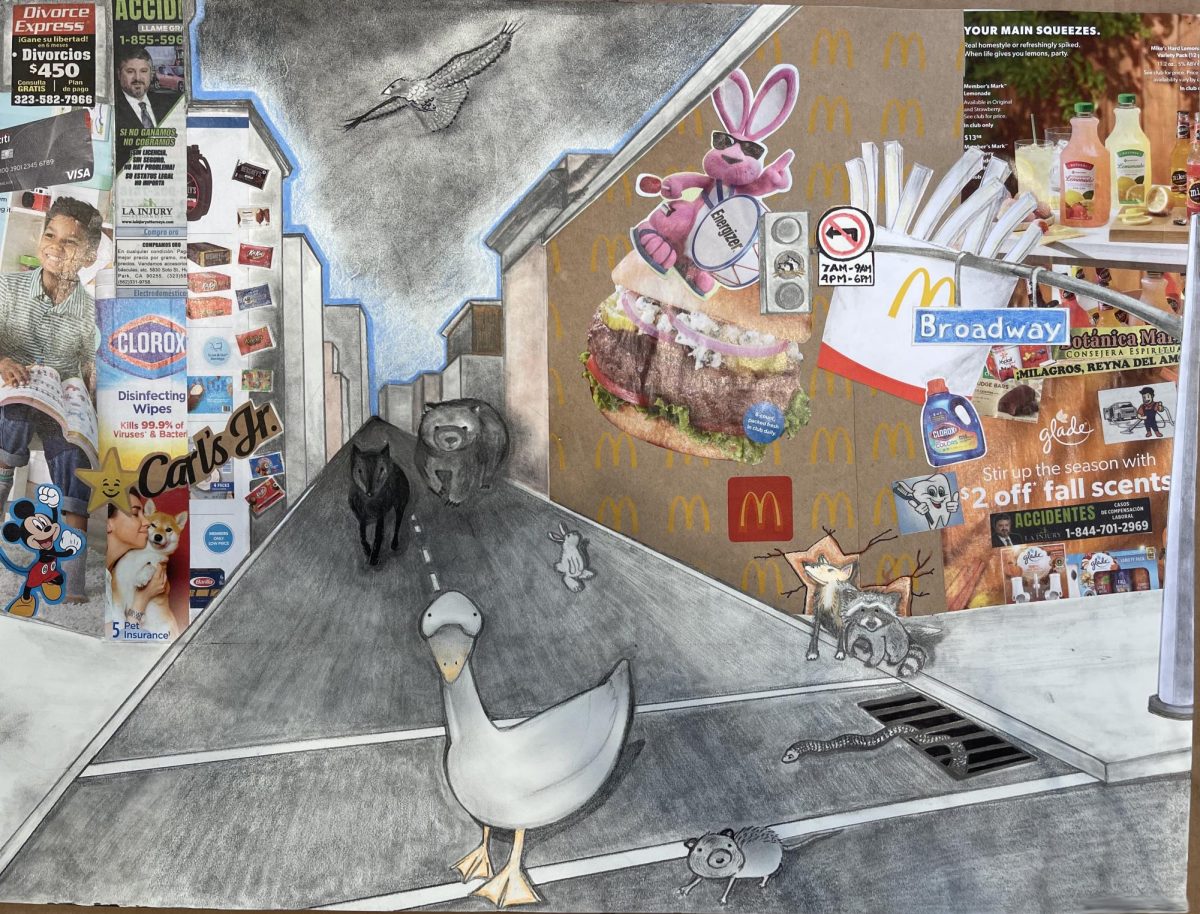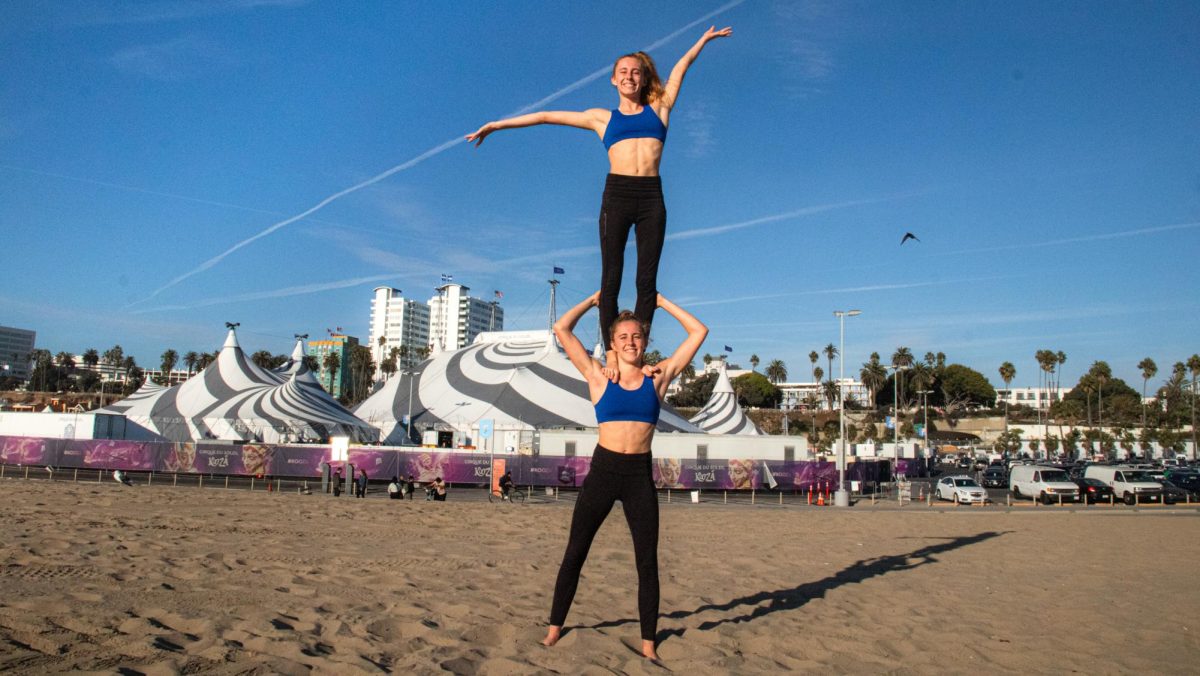Chance Williams was giving his thanks.
The 23-year-old El Camino College student-athlete was in a Sacramento Grand Sheraton Hotel attending the 2024 California Community College Athletic Association Conference.
It was Wednesday, March 27, and Williams and other students were honored at the Scholar-Athlete Luncheon. He was receiving a Student-Athlete Achievement award.
The football player with the short braids, broad chest, and deep southern drawl was 400 miles from the new home he had built at El Camino and 2,000 miles from his hometown of Nashville, Tennessee, which he had left years ago, alone, to pursue his football dreams.
Following his award there was a Q&A. When asked who helped him overcome his obstacles and thrive, Williams’ eyes scanned the back of the room.
He recalls telling the audience to turn around.
“‘Raise your hand’ I said and she raised her hand and I said ‘That’s the woman, right there, that helped me through my whole journey,’,” Williams later said. “That’s the reason that I’m here in front of you.”
Sitting there, near the back was El Camino College Basic Needs Coordinator Sharonda Barksdale, the only one who had made the 400-mile sojourn to support Williams.
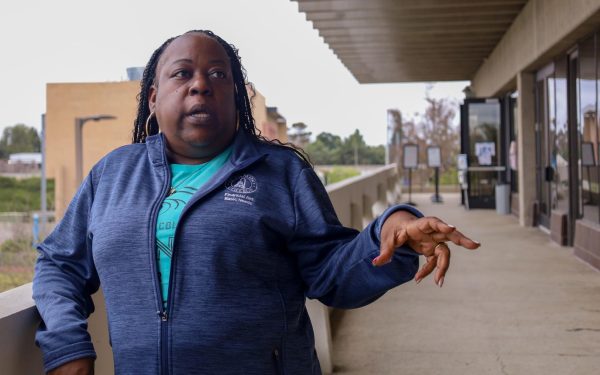
Officially, El Camino’s Basic Needs Coordinator since 2022, her role involves managing the resources and staff to provide “basic needs” such as food, clothing, housing, and transportation to at-need and qualifying students.
Barksdale works directly with students like Williams, who lack support and need guidance.
The 48-year-old Barksdale has a good poker face and wears it liberally.
She speaks quietly and confidently. Short braids that just reach her shoulders frame her dark features, including her ever-observant brown eyes.
Often clad in an El Camino T-shirt or sweater and some comfy pants, sneakerheads might appreciate the quality Jordans frequently found on Barksdale’s feet.
Barksdale works a 4/10 schedule. 10-hour days, four days a week at El Camino.
On weekends Barksdale teaches foster parents over Zoom for two other colleges.
It’s all done in a week’s work for the South LA native, who still lives in her hometown.
“I always liked helping people so I knew whatever I got into was going to somehow morph into me being able to help people,” Barksdale said.
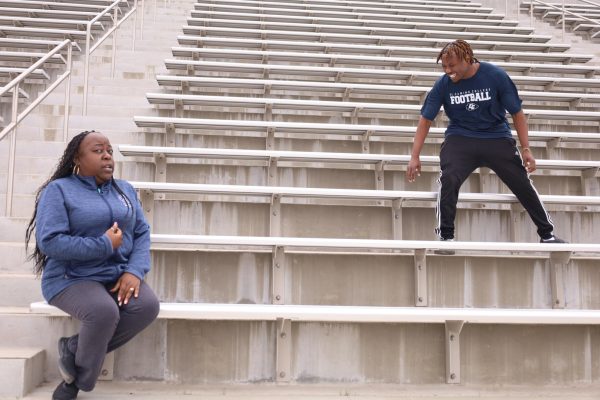
Barksdale and her team lead a persistent mission on campus to remove obstacles to students’ education, such as a lack of housing, food, or support.
Looking back, she considers herself one of the lucky ones. She had two loving parents who provided for her. Her parents were married for 26 years until her mother’s death.
Her dad was originally from Texas, and her mom was from northern California. After getting hitched, they moved to L.A.
Barksdale’s half-siblings on her dad’s side were older and lived apart. She was her mother’s only child and grew up with that mentality saying she was “spoiled rotten.”
Part of that “spoiling” was private education.
Attending a Christian School from K-6, she was exposed to a wide variety of cultures.
Barksdale’s parents both valued education, albeit in different ways.
A microbiologist with a master’s degree, her mother worked at Baskin Robbins for 20 years developing flavors.
Dad worked for the LA Unified School District. An upholsterer by trade, he also taught the craft at an LA Unified adult school.
“Education was very important,” Barksdale said. “That was something that was always stressed in my house.”
As she grew up Barksdale’s college plans were almost squashed when her father had a stroke, leaving him a paraplegic and her mom a caregiver. Barksdale struggled with a yearning to break free while also wanting to help her parents.
As a compromise, she ended up attending Concordia University, a small Lutheran College in Irvine. She spent her week taking classes and exploring interests but always came home on weekends to help.
“At that time, social work was not, like, a huge degree, so they had a bachelor in behavioral science program with an emphasis in social work,” Barksdale said. “That’s what I gravitated to.”
As part of her major, Barksdale had to join an internship and was accepted into a program through the Orange County Department of Probation.
She was placed in a juvenile hall, her first experience working with youth.
She worked with kids who had repeat experience in the system – tutoring, reading and helping them.
“A lot of it was just spending time there,” Barksdale said. “They could talk to me, I wasn’t a probation officer.”
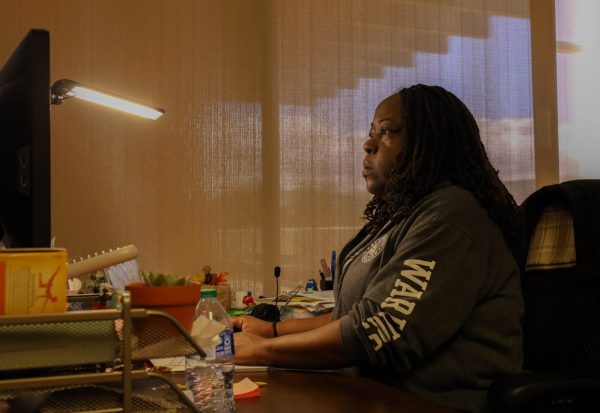
She bonded with a 14-year-old boy who was smaller than the rest, “but had a mouth on him.” On what was supposed to be his last day Barksdale said her goodbyes and told him, in the best possible way, she hoped never to see him again.
Four months later he was back.
She was upset. The boy calmly explained to her that he had taken a gun charge for a gang-affiliated brother to come back.
Barksdale’s was boggled. Why would you ever want to come back?
He explained life was better here. Not good, but better.
Here, he got food, shelter, and an education, which was not guaranteed outside. Barksdale tried to argue but couldn’t. It was a key moment.
“It wasn’t even ‘what can I do to help,’ it became, ‘something’s got to change and how are you going to play a part in this,’” Barksdale said. “I finished school and thought I’m going to put my superhero cape on.”
A second key point came when she became a social worker with the Department of Child and Family Services in LA, convinced she would change the world.
Instead, she found herself unable to sleep at night.
Frequently, she would be put in harm’s way, but perhaps worse was the mental toll. Barksdale recalls having to take crying kids from their mothers in all manner of situations, even serving a mother already in jail.
She began to get more involved with nonprofit organizations that intervened before families were separated.
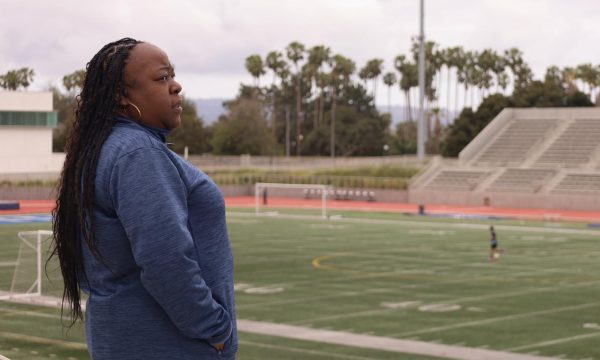
In 1999 she was working for the Los Angeles County of Education in a family preservation unit funded by the DCFS.
While working there, Barksdale met Alexis Estwick, who trained educators and social workers to work with foster youth using a “trauma-enforced lens.” The classes were hosted at El Camino.
After completing the training Estwick offered Barksdale the opportunity to teach independent living skills to foster youth and their parents. It was part-time, contractor work in the evenings, but as of 2001, Barksdale was now working at ECC.
“That is where I found my happy place,” Barksdale said, imitating the hallelujah sound effect. “In working with families.”
This was also when Barksdale first met David Brown, current assistant director of financial aid and her future boss.
Brown, who first began working at ECC in 1998, was working for EOPS at the time, helping foster and underprivileged youth apply for grants/financial aid.
Realizing they were on the same team and impressed by her hard work, Brown began collaborating with Barksdale.
Seemingly simple things like FAFSA and enrollment can be incredibly complicated for foster youth and people like Barksdale would help them navigate the bureaucracy.
“That’s what I’ve always respected about Sharonda,” Brown said. “The incredible amount of empathy she has, just her willingness and ability to just help.”
After some years, Barksdale returned to school to get her master’s degree. She graduated from Argosy University, from the Inglewood campus, in 2015.
After failing to get a full-time position, she left ECC and, in 2016, began working full-time as a community wellness specialist at Hathaway-Sycamores Child & Family Services, another youth non-profit. The job allowed her to stay in the Torrance area, although travel was frequent.
After two years a friend and coworker, Lizet Salazar, left Hathaway-Sycamore for a full-time role back at El Camino. Salazar soon called Barksdale telling her there was a position perfect for her.
In 2018 Kristina Martinez was working as the foster youth and homeless liaison at El Camino.
First hired in 2015 as assistant director of financial aid, Martinez became the foster liaison almost out of necessity.
The role involved interviewing students to help prove housing insecurity and teaching them to become independent.
Martinez knew two things—the role needed room to grow, and whoever they hired needed to understand at-risk youth and be able to justify decisions that considered not just money but also the human element.
There was only one problem. Barksdale didn’t know financial aid.
Salazar said to apply anyway. Her argument was she could learn financial aid, but they couldn’t teach her years of first-hand experience.
Brown agrees that the job was “very different” from a standard role.
“Because of the interaction with the students, because of the minutia and the demands and the high touch that’s involved with working with this population,” Brown said.
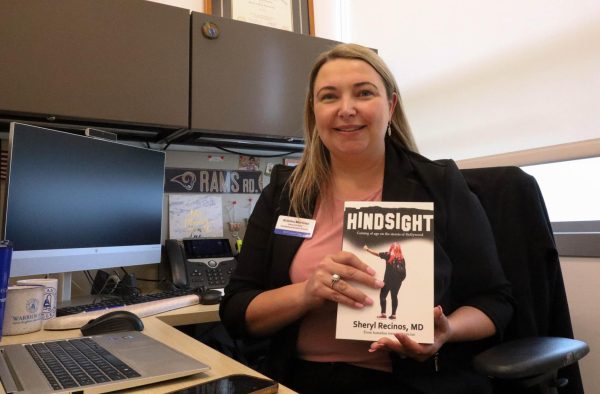
Martinez was in the room during Barksdale’s interview and was impressed by how quickly Barksdale verbalized a plan.
“She was captivating in terms of her vision for student support,” Martinez said.
Martinez and others were also impressed by Barksdale’s contacts and the relationships she had fostered after years of social work.
She was hired.
Sixteen years after her first contractor job Barksdale was working full time at El Camino, in a role that suited her skills.
By 2018, former Student Development Director Greg Toya was leading the U-Pass Initiative while Paola Villareal worked with Cal-Fresh. Before it became a part of the Basic Needs Center, Special Services Professional Kim Cameron managed the Warrior Pantry. Barksdale and others in financial Aid and Guardian Scholars provided resources and guidance for foster and underprivileged youth.
But Barksdale and Martinez wanted to do more.
The way Martinez tells it, the snowball for what would become the Warrior Closet began with both women wanting to offer students interview clothes. The two women began donating their own, but it wasn’t enough.
Through her contacts, Barksdale connected with a colleague who was offering a donation.
Expecting a few crates, Barksdale visited her colleague only to be led to a giant warehouse overflowing with clothes.
She was going to need a bigger car.
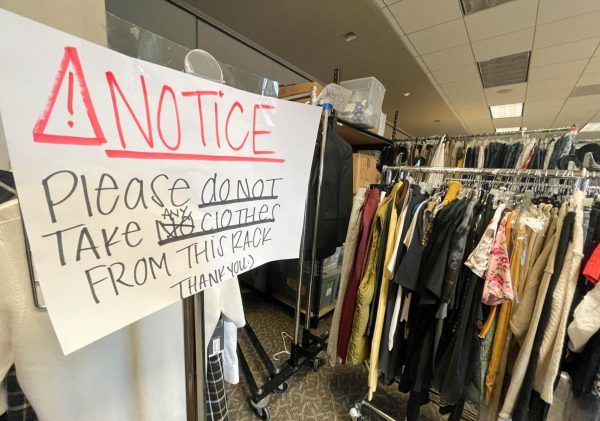
Returning to ECC Barksdale told Martinez about the offer. They quickly got the now-former Vice President of Student Services, Ross Miyshiro, on the phone and asked permission to get a rental.
The next thing Martinez knows, she, Barksdale, and another colleague are in a U-Haul racing down the road.
“We went to this place, and it was like a bungalow full of clothing on racks,” Martinez said. “So we just got the racks and we’re rolling them and I’m like, where are we gonna put all this and Sharonda says it doesn’t matter, this is too good of an opportunity we’ll deal with later.”
The group dashed back to campus and began stashing their donations in the Communications Building. Now, they had plenty of clothes to give away but no space, workers, or infrastructure.
“So then I’m like what are we gonna do, we got to tell the administration about this, they’ve gonna give us something,” Martinez said. “I told them we’re gonna start this closet and we need space for all these clothes.”
While it still took some time, Barksdale and Martinez’s donations misadventure inadvertently led to the Warrior Closet’s first iteration, the Warrior Closet popups.
With no permanent space, the pair took inspiration from thrift stores and would create temporary shops when available. But they were working “off the grid,” with little to no budget.

Martinez moved to counseling in 2019, but in her time with Shronda they had acquired stock that would last years and a semi-permanent space for the closet in the old MMBM 130 bungalows building, next to the pantry.
Then Covid happened.
As the college shuttered down, resources remained but distanced. The pantry offered drive-through food giveaways while Barksdale herself continued to work with foster and underprivileged youth online.
One of those students was Chance Williams who first met Barksdale when they were 500 miles apart.
Williams said he had a troubled upbringing, with a mother who suffered from addictions and an engineer father who prioritized himself.
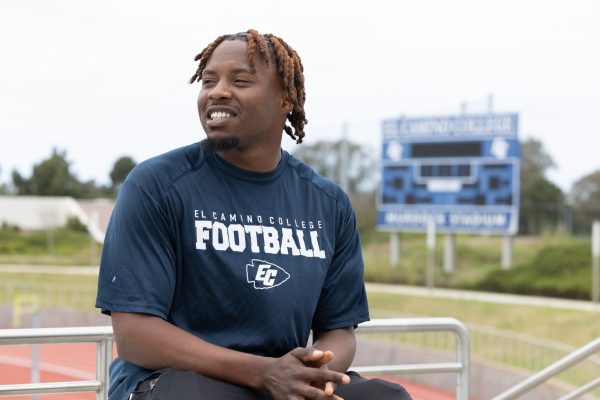
William grew up fast and he latched onto football as a way to improve his lot. Following the death of his mother, who had been living in Nevada, Williams decided to try and join the University of Nevada, Las Vegas football team as a walk-on.
He reached Nevada in early 2020 only to find the team didn’t offer walk-ons. Shortly after the lockdown happened, leaving Williams stuck.
He began looking for community colleges and, after connecting with a coach and looking through the ECC website, found himself in a Zoom meeting with an actual person.
Barksdale.
She broke down for Williams how to enroll and helped him fill out the proper paperwork. She told him it was up to him to get to Torrance and she would help him with everything else. Before the Zoom ended Williams asked her for her phone number, which Barksdale gave him.
He promised her she would see him again.
Months later, the two met for the first time on campus.
“She’s been my girl since before day one,” Williams said. “I love her.”
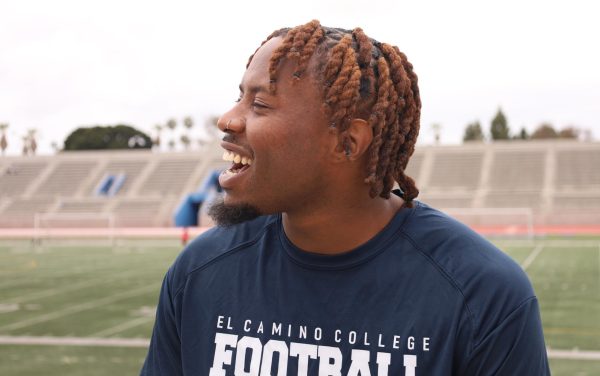
Amid COVID-19 big changes were happening, locally and statewide.
Program Specialist for the California Community College Chancellor’s Office Colleen Ganley has over 20 years experience working in resource services with nine of those years in the Chancellor’s Office.
Growing up using the same kind of services she now advocates for, Ganeley says she is “a believer.” Some who work with her lovingly refer to her as the Cal-Fresh lady.
“I work with 115 brick-and-mortar schools to help them provide services and establish basic needs centers,” she said. “That’s my core function at the Chancellor’s Office.”
In general, Ganley said colleges have known for years that some students struggle to meet their basic needs. But in the past, some viewed college’s responsibility as ending only with education.
“In more recent years, there’s been a lot of attention on this topic,” Ganley said. “What we came to realize is that everybody needs to be supporting the students.”
In 2019, the CCCCO, in partnership with the Hope Lab, conducted the first system-wide basic student needs survey. The survey data revealed that a significant number of students lacked what was considered basic needs, like housing or food.
“We were able to use that data in an advocacy capacity to say, look, we have a lot of students who have reported that they have these needs,” Ganley said. “This is something that needs to be resourced and the state stepped right up and resourced that.”
In 2019-2020 Califonia got its first legislative dollars meant for community college food pantries. $2.5 million was distributed between 115 colleges.
The next year, $10 million was split between the 115 colleges for pantries.
Covid exacerbated the need for further basic needs but also forced a funding pause.
In 2021-2022, state legislative talks began to develop the idea of basic needs centers with a full-time employee (or equivalent) across all California Community Colleges, with $30 million given to help begin development statewide.
A 2023 deadline was given.
Fast-forward to today, and the state has given $43.5 million to be split between the 115 colleges to expand basic needs centers and grow staff.
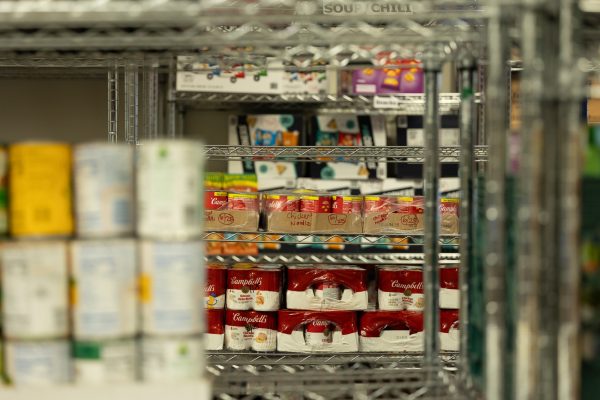
Ganely said one of the few problems money can’t solve is space. There are few options when colleges run out of geography.
Before legislation made basic needs a requirement El Camino already had the programs, they were just splintered. With the chancellor’s office now asking for one central hub they needed to find a person who could manage it all.
In early 2022, as ECC opened back up, new President Brenda Thames was holding open office hours. Barksdale made sure to be the first in line one day and asked Thames for a bigger, permanent space for the closet, stating that coming out of Covid, there was going to be an increase in need.
Thames agreed and gave Barksdale a space above the Bookstore.
That same summer she was offered and accepted the role of Basic Needs Coordinator.
Now, with a new space, the Basic Needs Center umbrellas, the closet, and the pantry provide not just food but other necessities like diapers, toothbrushes, etc. The center is also in charge of other student-centric resources including transportation and housing.
Regina Lee is an ECC advisor and now leads the Warrior Resource Program, helping to link students with even more resources like legal, mental, and technical help.
Cameron, who managed the pantry before it became a part of the Basic Needs Center still works with Barksdale at the center. She calls Barksdale the glue that keeps everything together.
Barksdale insists she is not a one-woman show and says the team, including volunteers and student workers, are the real glue.
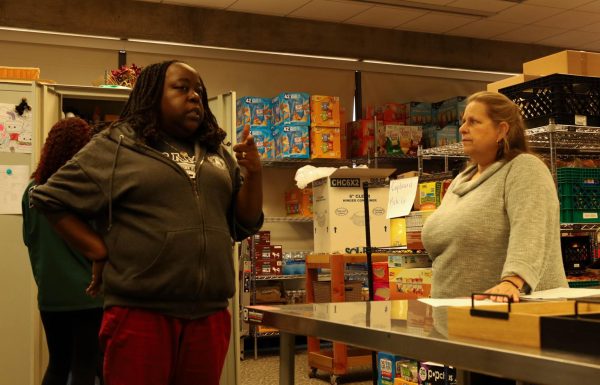
(Delfino Camacho | The Union)
For now, together with her longtime colleagues like Brown, Cameron, Paula Villareal and a plethora of student and part-time workers, the team works hard to keep the center stocked and running.
The center receives an impressive amount of quality food and clothes.
Tuesday through Thursday are “shop” days, meaning the pantry and wardrobe are open and busy serving students and community members.
Now a beehive of activity, during business hours the space is full of workers, all busy helping customers or working on back stock.
Student workers Rebecca Aquino and LaMeisha Brown are relatively new to the center but already love working with Barksdale and the crew.
“I feel like we’re the heart of El Camino,” Aquino said.
Barksdale said the work helps keep her “connected.” She believes as much as life can be beautiful, it’s not all roses and people need the skills to handle that.
“Life is learning how to navigate where your resources are, life is learning, how do I get around this speed bump,” she said.
Williams still visits the center. He unashamedly calls Barksdale, among other center workers, his “moms.”
They’ve dubbed him Chance the Rapper.
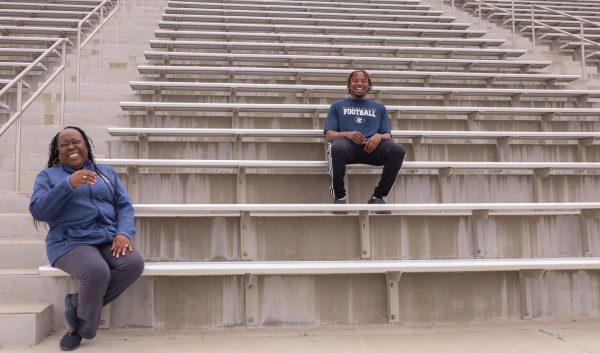
Williams said Barksdale is “a beautiful soul” and he’s grateful to have crossed her path. While Williams believes he and Barksdale share a special relationship he insists his story is not the only one.
Barksdale is a beacon for many, he said – students like him who needed help.
“That’s what bridges the gap in between, are those Miss Barksdale’s out there that offer resources, that go the extra steps to make sure kids have what they need,” Williams said.


